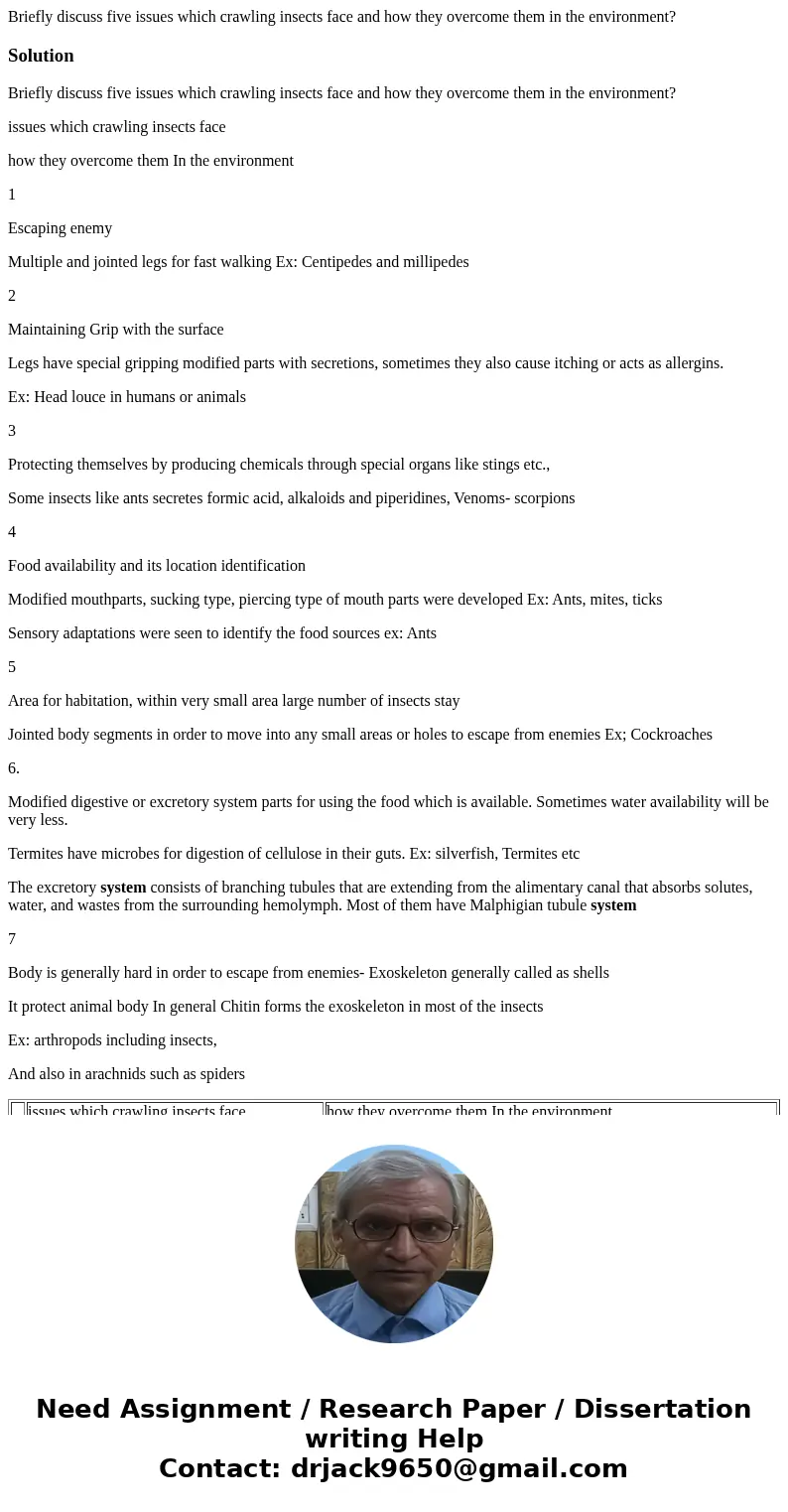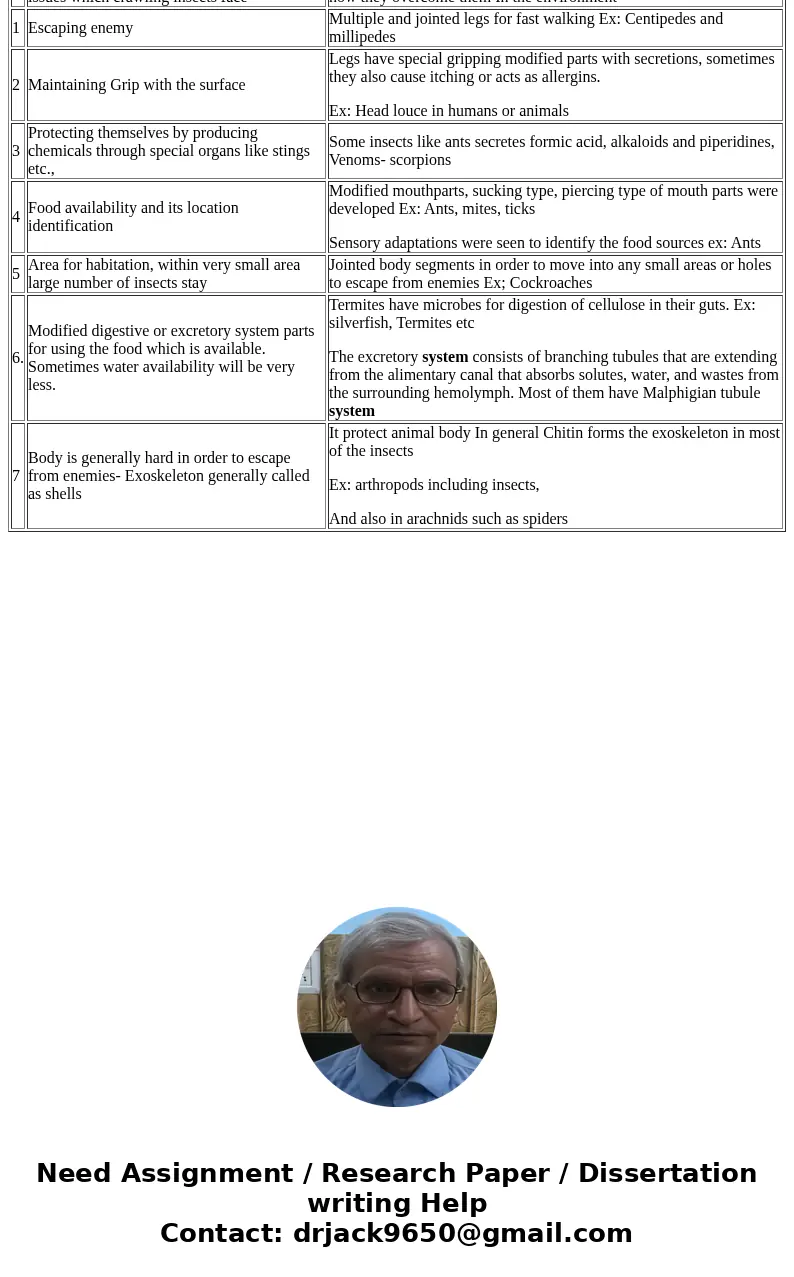Briefly discuss five issues which crawling insects face and
Solution
Briefly discuss five issues which crawling insects face and how they overcome them in the environment?
issues which crawling insects face
how they overcome them In the environment
1
Escaping enemy
Multiple and jointed legs for fast walking Ex: Centipedes and millipedes
2
Maintaining Grip with the surface
Legs have special gripping modified parts with secretions, sometimes they also cause itching or acts as allergins.
Ex: Head louce in humans or animals
3
Protecting themselves by producing chemicals through special organs like stings etc.,
Some insects like ants secretes formic acid, alkaloids and piperidines, Venoms- scorpions
4
Food availability and its location identification
Modified mouthparts, sucking type, piercing type of mouth parts were developed Ex: Ants, mites, ticks
Sensory adaptations were seen to identify the food sources ex: Ants
5
Area for habitation, within very small area large number of insects stay
Jointed body segments in order to move into any small areas or holes to escape from enemies Ex; Cockroaches
6.
Modified digestive or excretory system parts for using the food which is available. Sometimes water availability will be very less.
Termites have microbes for digestion of cellulose in their guts. Ex: silverfish, Termites etc
The excretory system consists of branching tubules that are extending from the alimentary canal that absorbs solutes, water, and wastes from the surrounding hemolymph. Most of them have Malphigian tubule system
7
Body is generally hard in order to escape from enemies- Exoskeleton generally called as shells
It protect animal body In general Chitin forms the exoskeleton in most of the insects
Ex: arthropods including insects,
And also in arachnids such as spiders
| issues which crawling insects face | how they overcome them In the environment | |
| 1 | Escaping enemy | Multiple and jointed legs for fast walking Ex: Centipedes and millipedes |
| 2 | Maintaining Grip with the surface | Legs have special gripping modified parts with secretions, sometimes they also cause itching or acts as allergins. Ex: Head louce in humans or animals |
| 3 | Protecting themselves by producing chemicals through special organs like stings etc., | Some insects like ants secretes formic acid, alkaloids and piperidines, Venoms- scorpions |
| 4 | Food availability and its location identification | Modified mouthparts, sucking type, piercing type of mouth parts were developed Ex: Ants, mites, ticks Sensory adaptations were seen to identify the food sources ex: Ants |
| 5 | Area for habitation, within very small area large number of insects stay | Jointed body segments in order to move into any small areas or holes to escape from enemies Ex; Cockroaches |
| 6. | Modified digestive or excretory system parts for using the food which is available. Sometimes water availability will be very less. | Termites have microbes for digestion of cellulose in their guts. Ex: silverfish, Termites etc The excretory system consists of branching tubules that are extending from the alimentary canal that absorbs solutes, water, and wastes from the surrounding hemolymph. Most of them have Malphigian tubule system |
| 7 | Body is generally hard in order to escape from enemies- Exoskeleton generally called as shells | It protect animal body In general Chitin forms the exoskeleton in most of the insects Ex: arthropods including insects, And also in arachnids such as spiders |


 Homework Sourse
Homework Sourse